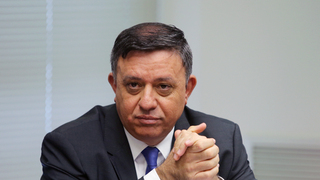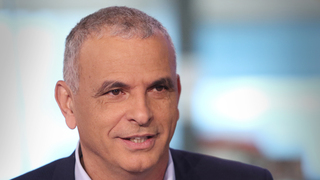On Way to Crypto Offering, Copyright Protection Startup Makes Misleading Claims
Israel-linked NKOR Ltd. is seeking to raise millions of dollars in the unregulated world of initial coin offerings
For daily updates, subscribe to our newsletter by clicking here.
NKOR’s website contains all the bluster of the typical pitch for a blockchain-based technology. In this case, the promise is a technology to revolutionize intellectual property protection. With the help of blockchain, artists of all kinds will be able to claim and defend their copyrights. No need for lawyers and middlemen.
 NKOR CEO Eric Klein. Photo: Youtube screenshot צילום: Youtube
NKOR CEO Eric Klein. Photo: Youtube screenshot צילום: Youtube But it’s not only legitimate startups that are flocking to the unregulated world of ICOs. So are scammers who are looking to exploit the crypto mania. In between, there are lots of startups who don’t always follow best practices but whose intentions are benign. For many would-be crypto investors, it can be hard to tell the difference.
Founded months ago and registered in Gibraltar, NKOR offers an example of a company whose behavior on the verge of ICO would have raised questions in a traditional due diligence process.
As with most startups, NKOR, lacking a track record, sought to shore up its credibility by associating itself with high profile business executives. The list of advisors on NKOR’s website at one point included the name Yohai Rayfeld. Mr. Rayfield is the chairman Pango Pay & Go Ltd., an Israel-based company which offers a parking app that has gained some popularity.
When Calcalist contacted Mr. Rayfield to verify his affiliation, however, he said he has “no connection” to NKOR. Eric Klein, NKOR’s chief executive, maintains that Mr. Rayfield agreed to act as an advisor but has since changed his mind.
NKOR’s digital tokens are currently available for sale on a “friends and family” basis. The few who are invited to join the sale at this point get to buy NKOR tokes at a steep discount. In the next few days, the ICO will enter its presale. As the with the launch of fancy sneakers or a new video game, the presale stage is simply meant to create hype ahead of the full launch.
Already at this point, the company says that it has raised some funding. Mr. Klein said the amount was $3.5 million. But, a day earlier, a spokesperson gave the number $1 million in response to an inquiry by Calcalist.
In the world of crypto, people interested in a particular ICO tend to congregate anonymously on a devoted group on Telegram. The messaging service serves as one of the avenues that many startups use to promote their ICO and provide information.
On January 24, after the official NKOR Telegram group went up, a few serial crypto investors formed a more exclusive offshoot group. The admin, whose identity is known, soon sent a message to the 800 followers who had joined.
He wrote that Ilan Ben-Dov, a veteran business executive and investor, is backing the crypto offering. Having owned one of Israel mobile phone operators, Mr. Ben-Dov is a well-known figure in Israel’s business community.
“We have an opportunity to join Ilan Ben-Dov’s NKOR ICO as early investors,” the admin wrote.
Like what happened with the Pango executive, when Calcalist contacted Mr. Ben-Dov for comment, he said he has no involvement with NKOR.
Mr. Klein said admin’s message in Telegram was probably the result of a misunderstanding.
“Someone apparently heard that Ilan is a friend of mine and somehow they got thinking that he’s involved in this,” Mr. Klein said. “I contacted the admin of the Telegram group and he apologized.”
NKOR’s founders outlined their vision for the company is a “white paper” describing a new technology that enables artists and others to protect their copyright for original music, images or other works. The encrypted architecture that is blockchain will be harnessed to help artists maintain control over how their intellectual property is replicated, reproduced and distributed, NKOR says.
According to a timeline described by Mr. Klein on Telegram, NKOR is planning to release an initial prototype that won’t run on a blockchain in February. The full product will be finalized in the third quarter of this year, he wrote.
Contradicting his publicly available Telegram post, however, Mr. Klein told Calcalist that the third quarter launch is not expected to incorporate blockchain.
“In the meanwhile, we are aiming to develop a version by the third quarter of the year that will not run on blockchain, because it’s hard to create a prototype that runs on blockchain,” he said.
















